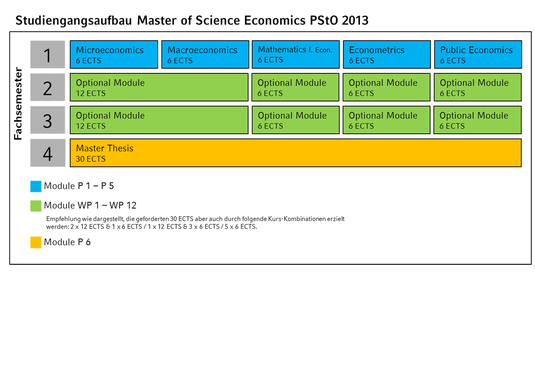Structure
The study program is structured into modules. In our Master's program a distinction is made between Compulsory Modules (CM) and Optional Modules (OM)
Overview
 It is recommended to choose the Optional Modules as shown in this table; 30 ECTS should be obtained each semester from OM courses.
It is recommended to choose the Optional Modules as shown in this table; 30 ECTS should be obtained each semester from OM courses.
In the 2nd semester it is suggested that students choose one 12 ECTS (“Studies in…”) course and three 6 ECTS (“Topics in…”) courses, in order to obtain the recommended 30 ECTS credits.
In the 3rd semester we recommend to choose one of the following combinations:
2 x 12 ECTS and 1 x 6 ECTS
1 x 12 ECTS and 3 x 6 ECTS
5 x 6 ECTS
Please note that in the course of your studies in the Master’s program you must accomplish at least one 12 ECTS module. A maximum of three 12 ECTS modules can be chosen and completed during your studies.
In the first semester students attend basic lectures and tutorials in:
- Mathematics for Economists
- Econometrics
- Microeconomics
- Macroeconomics
- Public Economics
Specialization
In the second and third semesters, students are free to choose courses from a wide range of modules. Students have the possibility to specialize. We offer the following fields of specialization:
- Microeconomics and Strategic Interaction
- Applied Econometrics
- Public Sector Economics
- Macro Economics and International Economics
In the Curriculum of the Specialization for the Master's Program (PDF 92 KB) all courses offered by the Department of Economics relating to their specialization can be found.
Please note that it is no longer possible to aquire a "Certificate of Specialization"
In the fourth semester, students write a master's thesis demonstrating their ability to produce independent scientific work in a specific area of economics.

